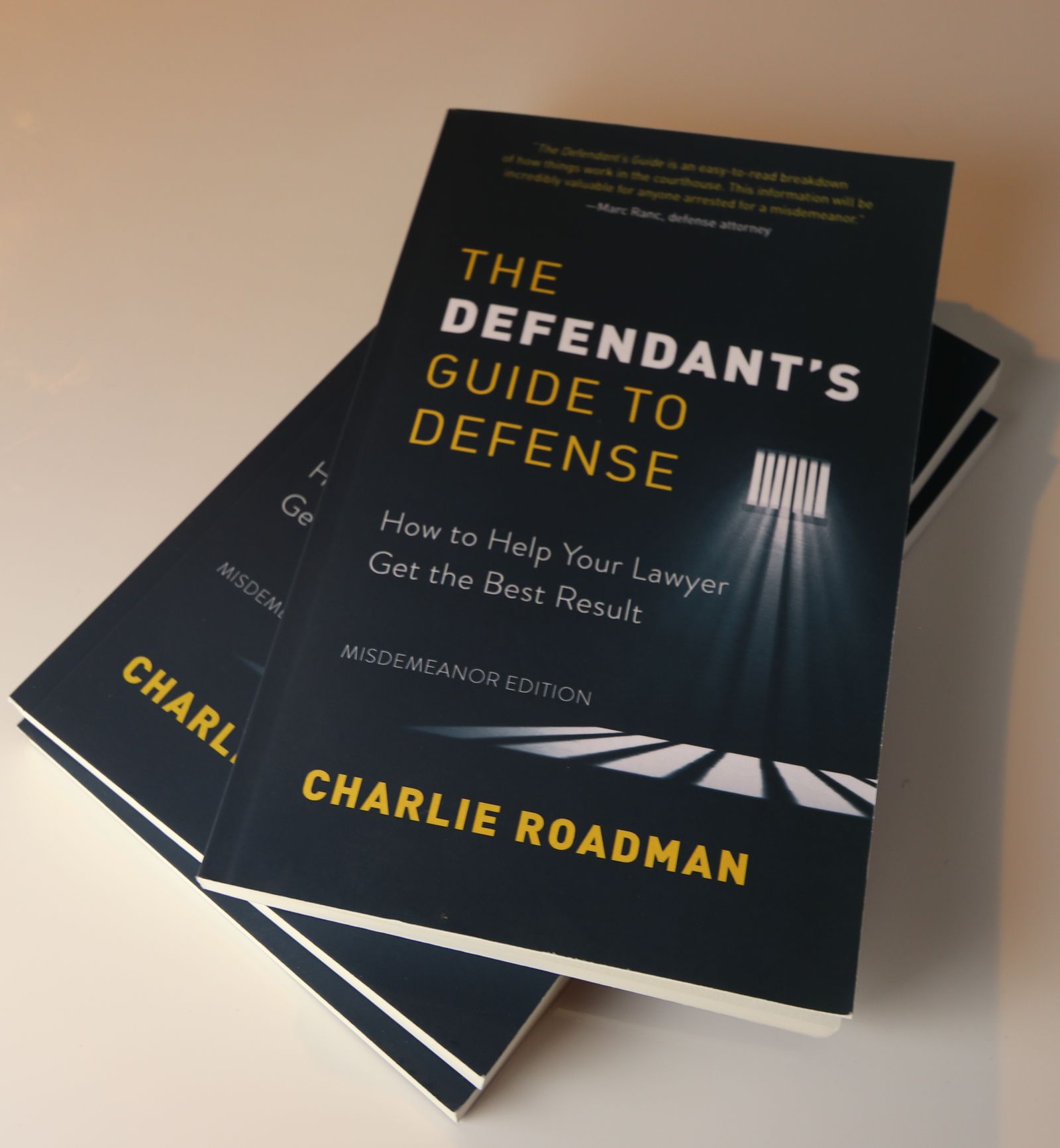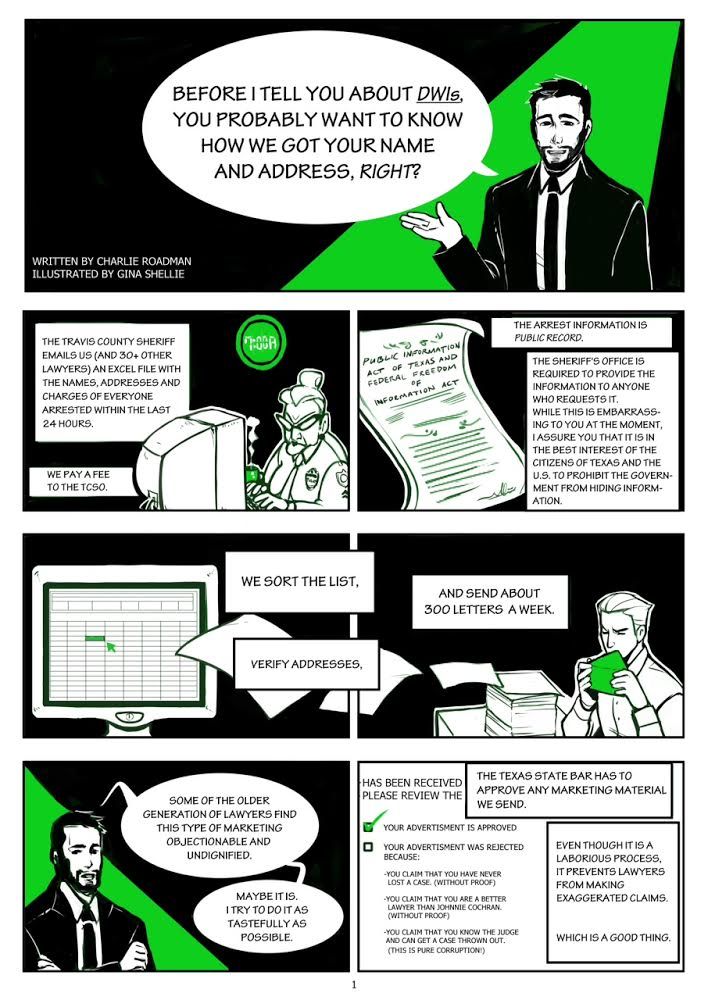Austin DWI Charges Episode 2
Welcome to Austin DWI charges, a four part conversation with Ellen Stader and Austin criminal defense attorney, Charlie Roadman. Charlie has handled over 500 DWI cases in his 15 year career as a defense attorney in Austin. In these interviews, he discusses the Travis County court system, strategies, negotiation, and what you should do after the arrest. For more information on Charlie, check out roadmanlaw.com. For more info on Ellen, check out austinwomenlove.com. Episode two.
Ellen Stader:
Hello, my name is Ellen Stader. I'm here with Charlie Roadman, of Roadman Law in Austin, Texas. We are talking about the process of navigating a DWI arrest. And the first thing I want to ask you, Charlie, is who are you? And why are you qualified to tell us all of this information?
Charlie Roadman:
Oh boy. Let's see. I'm 47 years old. I've been doing... I've been a lawyer for 15 years, a little over 15 years now. And criminal defense in Travis County in Austin, is all I've done for that whole 15 years.
Ellen Stader:
Wow.
Charlie Roadman:
So it's been a long time in these... There's seven floors of the Travis County courthouse that I've spent 15 years in.
Ellen Stader:
Fun.
Charlie Roadman:
Well, I like it. I mean, I like it. It's a different type of law work. So obviously, I went to school here at UT and a lot of my friends and colleagues went off and they're doing corporate law. And there's a lot of sitting around, looking at contracts and research and stuff. And this criminal defense has some of that, but not much. There's a lot of walking around and talking to people and getting this paper signed and getting that thing done.
Ellen Stader:
You're on the ground a lot.
Charlie Roadman:
On the ground. It's funny, I stopped playing soccer because I was like, I need to walk into old age. You know what I mean? This job would be so hard. And I do watch some of my colleagues get injured and-
Ellen Stader:
Wow. Just from the amount of walking and-
Charlie Roadman:
No, from whatever their extracurricular activities are.
Ellen Stader:
Oh, I see. I see. Right, right.
Charlie Roadman:
And then they're in the elevators, looking sad. And I look at it and I go, you know what? I just need to protect myself because-
Ellen Stader:
You don't think about the physical mobility needs-
Charlie Roadman:
Of a lawyer.
Ellen Stader:
Yeah.
Charlie Roadman:
Right. Yeah.
Ellen Stader:
Wow.
Charlie Roadman:
Anyway, so I do like the courthouse and I like all the people in the courthouse. I mean, or not all of them, but 99% of them are really great folks. And so, it's a good job.
Ellen Stader:
Right on. And I don't know a lot of lawyers, and maybe a lot of people don't know a lot of lawyers, but one thing that I found kind of unusual about your approach, is that you pay attention to the habits and the lives of the people that you take on as clients. I don't know how you say it. The community mindedness of your approach, seemed like something I didn't expect.
Charlie Roadman:
Yeah. It's interesting. It's evolved into that. You get to know the clients and it's... I say, it's almost like a chess board, where you're not playing. You're watching two people play chess and you can see the moves so easily, but when you're the one playing, it's hard to see. So I have this third party observation of seeing how people live and what they do. And so I do give advice and sometimes people take it, which is nice. So I don't need everybody... I just sort of try to help, and some people really seem to respond and some people wonder why the guy they've hired to be their lawyer, is-
Ellen Stader:
Trying to counsel them.
Charlie Roadman:
Yeah, trying to counsel them.
Ellen Stader:
Make different choices in their lives.
Charlie Roadman:
Yeah. But I can...
Ellen Stader:
Well, ultimately, your goal is to never have to represent them again, right?
Charlie Roadman:
It is. And it helps with their case if they make these improvements in their life, that I can document. And stuff that people don't necessarily even imagine would affect their case, but getting a new job, getting a promotion, even buying a house or something, I show this to the prosecutor, "Look. Look, this is what they're doing. They're working hard and they're going to school." And transcripts from school, prosecutors love to look at those.
Ellen Stader:
Oh, sure.
Charlie Roadman:
And that's the thing, the prosecutors, they don't see... I mean, they see the same stuff. The offense report, they just get the police officers version of the events and the police officer is going to write down stuff that's not good.
Ellen Stader:
Right.
Charlie Roadman:
They don't write positive things about you. So the prosecutors just, they're dealing with this bad data, and they're also bored with it. They do it all day long too.
Ellen Stader:
Right.
Charlie Roadman:
And so, they're just like, ugh.
Ellen Stader:
So they need to be shown some proof to the contrary, to balance out their perception of how this person is going to go forward from here.
Charlie Roadman:
Yes, to humanize them. And the thing that they're worried about most of the time, is that they're not actually worried about the arrest that happened. Okay, assuming nobody got hurt and it wasn't terrible, but just a normal DWI. What they're worried, is that it'll happen again.
Ellen Stader:
Right.
Charlie Roadman:
Okay? And so, I can't prove it won't happen again. Okay? Unless you're in prison, right? Can't get a car in prison. We could chop off your arms and legs, and even then, probably you could drive a car now with Siri or something. I don't know. You know what I mean? We can't prove it won't happen. But what we can do, is show that you're moving forward in life. And people that are doing well, have a lot to lose, and so there's less chance that you'll be reckless.
Ellen Stader:
Right.
Charlie Roadman:
And so, there's no... I just have to give them circumstantial evidence that things are... That it won't happen again.
Ellen Stader:
Right on.
Charlie Roadman:
So I think we talked... Actually, what was the question?
Ellen Stader:
What are judges concerned about? Or, you want to go to driver's license?
Charlie Roadman:
Yeah, let's go to the driver's license.
Ellen Stader:
Okay. Okay. So Charlie, what happens with your driver's license?
Charlie Roadman:
Yeah, that scares people a lot. So first, if you get arrested for a DWI, they will typically take your... Physically take your driver's license and you'll get a temporary notice that says, you can drive for 40 days. And then it'll be suspended for either three months or six months, depending on whether you blew or not.
Ellen Stader:
So you carry this temporary thing around with you?
Charlie Roadman:
Yes.
Ellen Stader:
Okay.
Charlie Roadman:
Now the thing that's interesting, is that you can go get a new driver's license. Okay? And I have a video about this on my website. But you go to DPS and you say, "I lost my license." Which you did, to those cops.
Ellen Stader:
Right.
Charlie Roadman:
DPS doesn't care. They're not going to get mad at you. They're not going to see that you are arrested.
Ellen Stader:
They're not going to flag you and call the cops again.
Charlie Roadman:
No. Yeah, no, no. They just do not care. And it's interesting, the reason they don't care. Just because you have your physical driver's license, doesn't mean it's okay for you drive, right? It's whatever the cops... When they type it into their computer, and then that computer calls DPS supercomputer and says, "Is John Doe okay to drive?" And if it says no, they're going to arrest you for driving. It doesn't matter if you have 10 driver's license, right? So DPS doesn't really care that you're getting a new license. The other thing is, they never give you back your old one. Okay? So it doesn't make any sense to not go get a new one as soon as possible.
Ellen Stader:
Right.
Charlie Roadman:
Because obviously, we use our driver's licenses for normal day to day stuff.
Ellen Stader:
For everything. Yeah.
Charlie Roadman:
So you go get a new one. The question then becomes... But it's weird, right? Because you have one law enforcement agency take it away from you, and another give it to you.
Ellen Stader:
Right.
Charlie Roadman:
And you're just like, well, that's weird. But the reason they take it from you... And it's always the politicians, right?
Ellen Stader:
Oh, tell us.
Charlie Roadman:
It's because some politician heard, or there was a news article saying people got to, quote, keep their licenses when they were arrested for a DWI. So they run down to the courthouse, file a bill that we're going to take your driver's license. And so that's what they did. And so now the police just have to take it, which doesn't serve any purpose. Okay? So remember I was saying how rational the system is? Well, here's the exception. This is not rational. This is just sort of punitive. It's goofy. But luckily, you can just go get a new one.
Ellen Stader:
Sure. It's just another hoop to jump through now.
Charlie Roadman:
It's another hoop to jump through. And when you go to DPS, they'll give you that little index card one. And then in 10 days, in the mail, you get your new license.
Ellen Stader:
Right.
Charlie Roadman:
Now that 40 day period, what we do or any good DWI attorney would do, is request a hearing on that, which will delay the suspension for, honestly, six months. And then if the officer shows up for the hearing, it's hard to win, because they just have to say some traffic violation and smelled like alcohol, and they win. But then we'll get our clients an occupational license, so they'll be able to drive anyway. So they suspend your license, but then they give you permission to drive anyway. And not just for work, because a lot of people think it's just working back, but it's any household duties.
Ellen Stader:
This is an occupational-
Charlie Roadman:
This is an occupational license. And so, groceries? Yes. The working out, that's physical. Medical stuff. The only thing that you really can't do, are entertainment related, right? So bowling alleys, karaoke, stuff like that.
Ellen Stader:
Bars, obviously.
Charlie Roadman:
Bars, obviously.
Ellen Stader:
But you can drive back and forth to work. You can take your kids to school, shopping, medical. Yes.
Charlie Roadman:
Anything that's-
Ellen Stader:
Anything that's not fun.
Charlie Roadman:
Yeah, exactly. That you need to survive. But there are... You have to get some certain things for an occupational license, like an SR22 insurance, which is a little more expensive insurance. There's a clerk's fee. You have to get a driving record. Anyway, there's stuff that... We explained it all. There's a video on my website that explains all this too. But the driver's license thing is manageable.
Ellen Stader:
Right. It just takes some focused hoop jumping.
Charlie Roadman:
Yes, and a good attorney to walk you through the steps.
Ellen Stader:
Yeah. How long does an occupational license last?
Charlie Roadman:
It'll last as long as the suspension period.
Ellen Stader:
Okay.
Charlie Roadman:
So, permits you to drive. And really, there're two types. There's some that are... Occupational licenses that have time restrictions. And a lot of our clients just do 7:00 AM to 7:00 PM, but you can break it up. And anyway, we explain it more on the website. But then there's another type of occupational license where you have the blow device in your car, the ignition and lock device. And that doesn't have any time restrictions, which sort of makes sense, right?
Ellen Stader:
Sure.
Charlie Roadman:
If you could demonstrate you're not drinking, they're going to-
Ellen Stader:
Yeah.
Charlie Roadman:
You can drive whenever you want.
Ellen Stader:
Yeah.
Charlie Roadman:
And depending on... We get either one of those types, sort of depending on how the client's case is going. But anyway, you don't have to make that decision for six, seven months after you've been arrested.
Ellen Stader:
All right.
Charlie Roadman:
Once you've hired a good attorney.
Ellen Stader:
Much like yourself.
Charlie Roadman:
Well, there's plenty of us out there.
Ellen Stader:
So you've mentioned a couple of times that there are videos on your website that help people understand and navigate these things.
Charlie Roadman:
Yeah, yeah.
Ellen Stader:
So, just lay it out. What is your website?
Charlie Roadman:
Oh, roadmanlaw.com. And then on the top, it just says videos. And I think we've got about a dozen now that talk about occupational licenses, ALR hearings, a bunch of little things. We do a new video every three weeks or so.
Ellen Stader:
Right. Explaining terms and little facets of the process.
Charlie Roadman:
Yeah.
Ellen Stader:
Okay.
Charlie Roadman:
Yeah. And there's one that I like, that my kids did with me, where I put the ignition lock device on my car for two months and just filmed it and what it was like. And I posted that and I thought that a couple hundred people would watch that, but it's up to 60,000 people have watched this documentary, and it's-
Ellen Stader:
Is it because your kids blow and drive, and that's why people want to watch it?
Charlie Roadman:
Try to blow. They can't... Anna was doing it, but she doesn't have the lung capacity to blow long enough. But it's funny watching her try, her little face is all red. She can't do it. But anyway. But if you watch that video, I mean, you'll know what it's like. You know what I mean? Because people get this bond condition or they have this... Or they know it's coming down the line, that they're going to have to get the ignition lock device, and they have a lot of fears. The first one being, that everybody can see. And people on the outside, can't see. Now if someone's in your car, they're going to see.
Ellen Stader:
Right.
Charlie Roadman:
Can't hide that. But anyway, we address all sorts of stuff in the video about that.
Ellen Stader:
Go to the website, watch the videos. They are highly informative.
Charlie Roadman:
Yes, yes.
Ellen Stader:
All right. So do we want to go to court dates?
Charlie Roadman:
Yeah. Yeah, let's see.
Ellen Stader:
Okay, so the initial trauma is over. You've had the arrest, you've made bond, you're fulfilling the bond conditions. Next up are court dates, huh?
Charlie Roadman:
Yeah, court dates. And it's interesting. In Travis County, there's three, four... Three or four court dates that are administrative in nature, so nothing really happens. Okay? So if you don't have an attorney, you, the defendant, has to go to each of those court dates. Although, it's just takes 15 minutes, you say, "Hi, I'm here."
Ellen Stader:
Stand there and watch someone sign something and move on.
Charlie Roadman:
Move on. And it's not even... Most of them aren't even in courtrooms, they're just in office rooms. If you have an attorney, your attorney will go to those for you.
Ellen Stader:
And you don't have to go?
Charlie Roadman:
And you don't have to go. And that freaks some people out. They go, "Well, I want to go. I want to go, to show them I'm taking it serious." And I always say, "If you got any credit for going, I would insist that you go."
Ellen Stader:
Right.
Charlie Roadman:
They don't want you there. They want me or your attorney there. There's no-
Ellen Stader:
There's no advantage to going.
Charlie Roadman:
Nothing.
Ellen Stader:
Okay.
Charlie Roadman:
But what we do for our clients that are nervous, because there are a lot of bad stories about defense attorneys that disappear or whatever, I say, "I've done this 15 years and gone to tens of thousands of court dates, never missed one." I don't miss court dates. Anyway. But we send emails to our clients, every single court date, saying what happened, why it happened, what's up next. And what's the next court date, do you need to go, and that kind of thing. So we make sure it's all... You don't have to...
Ellen Stader:
You don't have to guess, and you don't have to wonder.
Charlie Roadman:
Guess. It's in your email.
Ellen Stader:
Yeah.
Charlie Roadman:
What happened, so. So the court dates... And the reason that there are these administrative, the first two are called first appearances, and the prosecutors have to physically make a file. Okay? And they have so many arrests, that they just can't make files that quick. They just got stacks. And they have to put it together, they have to formally charge you with a... Where they say, on or about January 22nd, so and so did this while intoxicated. They have to... A human has to put that together, so far. I mean, they haven't built the AI robots yet to do that. Okay. So anyway, it takes them a couple months and then they assign you to a court. Okay. And Travis County has, I think seven or eight courts, misdemeanor courts, and then another seven or eight felony courts. And in the misdemeanor courts, there isn't a bad judge. Okay? So they're all reasonable people. There's no hanging judge or-
Ellen Stader:
That's good to hear.
Charlie Roadman:
Yeah. There's also-
Ellen Stader:
Nobody's name you have to watch out for, and be like, oh.
Charlie Roadman:
Because we can't control it. I mean, it's truly random, where you go. And there's also no judge that I can manipulate. You know what I mean?
Ellen Stader:
Right.
Charlie Roadman:
They're all smart lawyers. They're not going to be... They're not going to miss something.
Ellen Stader:
And they're really just focused on keeping cases moving through and-
Charlie Roadman:
Yeah, and protecting the community. So they're looking for red flags, and they don't... One of the biggest things they fear, is that a case that's on their docket, where there might have been a red flag, like someone got a public intoxication class C ticket that they knew about and they didn't do anything, and then next, there's another DWI and someone gets hurt.
Ellen Stader:
Right, right. Why did the judge let that through?
Charlie Roadman:
Right. Okay. And I call that, the hypothetical future tragedy. Okay?
Ellen Stader:
Okay.
Charlie Roadman:
That's what everybody's thinking about, is just, could something bad happen?
Ellen Stader:
What is the worst case scenario?
Charlie Roadman:
What's the worst case scenario? And so, anyway. The judge, they're thinking about that. They do want the stuff to go through quick... Not quickly. They want things to move efficiently along, okay? Because if it didn't, everything could get backed up and no one would be able to go home. We'd have to have 24 hour courts, so they don't want that. They're concerned about... Well, people sometimes, when we're talking about their DWI case, they say, "Well, what's the judge going to say about this or that?" I will say, it's typically not the judge that we're dealing with. It's the prosecutor, right? The judge will become involved if there's a trial, or at the final stage, if there's a plea bargain or if they're signing a dismissal or something like that. But 95% of my communication is with the prosecutor, the county attorneys that are working there. So judges, they're like referees. They just want to make sure everything is fair to all sides, to the defendant as well.
Ellen Stader:
But people's fate largely hangs in the balance between you, or the defense attorney and the prosecutors.
Charlie Roadman:
The prosecutor is the one that makes the plea bargain. And a plea bargain is kind of a loaded term. A plea bargain can be a dismissal, right? So it can be dismissed if you do this or that. Anyway. So yeah, the prosecutors are the ones that make that decision of what they're willing to do. And if we don't like it, we can have a trial. Or if some part of the process was unfair or unconstitutional, we would have a hearing in front of the judge and the judge would decide whether it was unfair or unconstitutional. And if it was, they'll typically throw out the whole case. Okay? That doesn't happen a lot, just because the way we discover most unconstitutional behavior by the police officers, is through the video of the arrest. And they're the ones that turn on the video. And so they do have enough sense to, usually, okay?
Ellen Stader:
Right.
Charlie Roadman:
To stop doing unconstitutional things after they've turned on the video. But sometimes we catch them from, their colleague turned on the video and they didn't know it.
Ellen Stader:
Wow.
Charlie Roadman:
Anyway. We're looking for things, obviously, to get cases thrown out. And we do find it occasionally, but usually the police have just enough sense to not get caught.
Ellen Stader:
Yep. That's part of the job, right?
Charlie Roadman:
Yeah. So yeah, the county attorneys. The judges are reasonable people. The county attorneys are also... They're lawyers, they've been through law school. They're not insane. You really can't get through law school being totally insane. I mean, a little bit, maybe. But they do have... There's differences, in terms of their personalities. I mean, you do have some that are indignant. They kind of... They're really not sympathetic, but that's rare. That's kind of the far side of them. You have some that are just like, man, but for the grace of God [inaudible 00:23:11] right? And that's a common feeling, because the prosecutors, they drink. They know. And so the first DWI, as long as there wasn't too high of BAC, I mean, the courthouse is... They're not indignant. The second, the third, then they start to go, ah.
Ellen Stader:
Yeah, I'm not so inclined to cut this person a break.
Charlie Roadman:
Yeah, yeah.
Ellen Stader:
Yeah.
Charlie Roadman:
But the first one, they're looking at it, but a lot of it'll depend on the blood alcohol content. Because they'll see a 0.11 and they'll go, okay. I probably have driven at 0.11.
Ellen Stader:
Right.
Charlie Roadman:
But then you get to 0.27 or something, which is not far away from unconscious.
Ellen Stader:
Right.
Charlie Roadman:
And they're going to go, well, this is bad.
Ellen Stader:
Yeah. You can't really justify that.
Charlie Roadman:
Yeah, yeah.
Ellen Stader:
Yeah.
Charlie Roadman:
That's not even within the spectrum of acceptable. So, anyway. The prosecutors, we know them all and we try to get our cases to the ones that would be the most sympathetic and, or be the most lenient.
Ellen Stader:
And make the most reasonable deal you can.
Charlie Roadman:
Yeah. And be open to the stuff that our clients do, to try to reduce the punishment.



